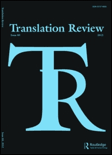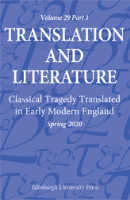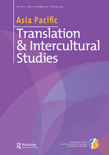
TRANSLATION REVIEW
Scope & Guideline
Bridging Theory and Practice in Linguistics.
Introduction
Aims and Scopes
- Exploration of Translation Theory:
The journal consistently engages with theoretical frameworks surrounding translation studies, examining how various theories influence practice and understanding of translation. - Focus on Literary Translation:
A significant portion of the journal's publications is dedicated to literary translation, highlighting the nuances and complexities involved in translating poetry, prose, and dramatic works. - Interviews and Conversations with Translators:
The journal features interviews with prominent translators, providing personal insights into their creative processes and the challenges they encounter, thus enriching the discourse on translation. - Cultural and Political Contexts of Translation:
'Translation Review' addresses the role of translation within cultural and political frameworks, particularly in contexts of conflict, migration, and globalization. - Innovative Approaches to Translation:
The journal showcases innovative methodologies and technologies in translation, including the impact of digital tools and AI on the translation process. - Community and Collaborative Translation:
There is an emphasis on translation as a communal activity, exploring how translators collaborate and engage with communities to enhance cultural exchange.
Trending and Emerging
- Ukrainian Literature and Translation Amid Conflict:
The journal has increasingly focused on Ukrainian literature and the challenges of translating it during wartime, emphasizing the role of translation in cultural resilience and preservation. - Digital Technologies in Translation:
There is a growing interest in how digital tools and AI, such as ChatGPT, are transforming the translation landscape, sparking discussions on the implications for creativity and authorship. - Transcultural and Translingual Practices:
Emerging themes include transcultural poetics and translingualism, exploring how translation facilitates cross-cultural dialogues and the blending of linguistic identities. - Translation as a Process of Community Engagement:
The journal is increasingly examining translation as a communal practice, highlighting collaborative efforts among translators and their contributions to cultural understanding. - Narratives of Mistranslation and Miscommunication:
Recent articles delve into the complexities and challenges of mistranslation, illustrating how miscommunication can lead to significant cultural misunderstandings and the importance of context in translation.
Declining or Waning
- Traditional Translation Techniques:
There has been a noticeable decline in the discussion of traditional translation methods, as the journal increasingly embraces contemporary practices and technologies. - Focus on Historical Translation Practices:
While historical perspectives on translation were once prevalent, recent issues show a waning interest in this area, possibly due to a shift towards more current and practical applications of translation. - Narrowly Defined Translation Genres:
The exploration of niche translation genres has decreased, with more emphasis placed on broader themes and interdisciplinary approaches that encompass a wider range of literary and cultural practices.
Similar Journals

Letteratura e Letterature
Exploring the Depths of Literary and Linguistic Theory.Letteratura e Letterature is a distinguished scholarly journal dedicated to exploring the nuances of literature and linguistic theory, published by FABRIZIO SERRA EDITORE. This journal, identifiable by its ISSN 1971-906X and E-ISSN 1973-2600, serves as a significant platform for researchers, professionals, and students engaged in critical discourse within the fields of Literature and Linguistics. With a focus on fostering interdisciplinary dialogues, it seeks to illuminate diverse literary phenomena and linguistic intricacies, contributing meaningfully to the academic community. Despite being categorized in the Q4 and Q3 quartiles in 2023, the journal remains a vital resource, encouraging innovative scholarship and broadening the understanding of literary and linguistic interactions. Although it does not currently offer open access, the journal promises rigorous peer-reviewed content, ensuring the quality of published research. Operating from its base in Pisa, Italy, the journal continues to embrace its converged years from 2014 to 2021 and the ongoing 2023 to 2024 period as an era for refined scholarship and vibrant academic exchange.

Estudios de Traduccion
Exploring the dynamic landscape of translation research.Estudios de Traduccion is a distinguished academic journal published by UNIV COMPLUTENSE MADRID, SERVICIO PUBLICACIONES, dedicated to advancing the field of translation studies. Since its establishment, the journal has embraced an Open Access model, providing researchers, professionals, and students with free and unrestricted access to high-quality scholarly articles since 2011. With the ISSN 2174-047X and E-ISSN 2254-1756, it serves as a vital resource for those interested in innovative methodologies, theoretical advancements, and practical applications within translation. By championing interdisciplinary research and fostering dialogue among scholars from diverse backgrounds, Estudios de Traduccion plays a crucial role in shaping the understanding of translation as a dynamic and evolving discipline. As a reputable platform, it invites contributions that stimulate critical thought and inspire future research in this essential area of communication.

Academic Journal of Modern Philology
Elevating Modern Philology to New HeightsWelcome to the Academic Journal of Modern Philology, a premier platform dedicated to advancing the field of philology and linguistics. Published by the esteemed Committee Philology Polish Academy of Sciences, Wroclaw Branch, this open-access journal has been committed to disseminating high-quality research since 2014, ensuring widespread access and engagement within the scholarly community. With an ISSN of 2299-7164 and an E-ISSN of 2353-3218, the journal invites contributions that push the boundaries of contemporary philological inquiry, bridging traditional scholarship with modern linguistic challenges. Situated in Poland's vibrant academic milieu, it aims to foster interdisciplinary dialogue while highlighting the importance of philology in understanding cultural and linguistic diversity. Researchers, professionals, and students alike will find a wealth of insightful articles that contribute to the evolving landscape of modern language studies.

Skandinavskaya Filologiya
Unveiling the Rich Tapestry of Scandinavian Heritage.Skandinavskaya Filologiya is a distinguished academic journal published by St Petersburg University Press that specializes in Scandinavian philology and linguistics. With its ISSN 0202-2397 and E-ISSN 2618-9518, this journal serves as a vital platform for scholarly articles that explore the intricate languages, literature, and cultural nuances of the Scandinavian region. The journal seeks to promote interdisciplinary research and foster collaboration among linguists, literary scholars, and cultural researchers interested in the rich heritage and contemporary developments within Scandinavian studies. Although the journal operates without open access, it is committed to enhancing academic discourse and providing a valuable resource for students, professionals, and researchers. Located in the vibrant city of St Petersburg, Russia, the journal aims to bridge the gap between Eastern and Western scholarship in Scandinavian philology, making it a significant contributor to the field.

Translation and Literature
Innovating Perspectives on Translation and TextsTranslation and Literature is a leading academic journal published by Edinburgh University Press, focusing on the intricate relationship between language and literature within the realms of translation studies. With an ISSN of 0968-1361 and an E-ISSN of 1750-0214, this journal provides a crucial platform for scholars and practitioners to explore and disseminate research that addresses both the theoretical and practical aspects of translation. Since its inception in 1996, Translation and Literature has established itself as an essential resource, particularly noted for its contributions to the fields of linguistics and literary theory, as indicated by its Q4 ranking in both categories in 2023. The journal's articles are designed to foster dialogue across disciplines, encouraging innovative thinking and collaboration among researchers, professionals, and students alike. Access to this valuable resource is currently available through subscription, ensuring high-quality scholarship reaches a diverse audience dedicated to advancing the understanding of translation's role in literature.

Quaderns-Revista de Traduccio
Bridging Languages, Cultures, and IdeasQuaderns-Revista de Traduccio, published by the Universitat Autònoma de Barcelona, is a prominent journal in the field of Linguistics and Language, which has garnered recognition for its scholarly contributions since its inception. With an ISSN of 1138-5790 and an E-ISSN of 2014-9735, this journal has maintained an active publication schedule across notable cycles, contributing valuable insights from 2011 to 2018 and continuing from 2020 to 2024. As a Q3 category journal in both Arts and Humanities and Social Sciences related to Language and Linguistics, it occupies an important niche, ranking #607 out of 1088 and #692 out of 1167 respectively. Though currently not an open-access journal, its rigorous peer-review process ensures that published articles meet high academic standards, making them relevant for researchers, professionals, and students alike. Housed in Cerdanyola del Vallès, Barcelona, this journal serves as a critical platform for the dissemination of cutting-edge translation studies and linguistics research.

Asia Pacific Translation and Intercultural Studies
Transforming communication: insights from the Asia-Pacific region.Asia Pacific Translation and Intercultural Studies is a vital academic journal published by Routledge Journals, Taylor & Francis Ltd, focusing on the interdisciplinary fields of translation studies and intercultural communication. With an ISSN of 2330-6343 and E-ISSN of 2330-6351, this journal plays a pivotal role in advancing scholarship in cultural studies and linguistics, earning a commendable Q2 ranking in both fields for 2023. The journal, catering to researchers, professionals, and students alike, aims to foster a deeper understanding of the myriad ways cultural contexts shape translation practices in the Asia-Pacific region and beyond. Despite its open access status being undisclosed, it regularly publishes high-quality peer-reviewed articles that contribute to the academic landscape, with a Scopus ranking reflecting its relevance and impact in interrelated domains. As the journal continues its mission from 2019 to 2024, it stands as an essential resource for anyone interested in the dynamics of translation and intercultural interactions in a rapidly globalizing world.

Trans-Revista de Traductologia
Elevating Academic Discourse in Translation StudiesTrans-Revista de Traductologia, an esteemed journal in the realm of Translation Studies and Linguistics, is published by the University of Malaga's Faculty of Philosophy and Letters. With an Open Access model since 2015, it facilitates the global dissemination of research and findings, supporting the academic community and enhancing visibility for scholars. The journal spans research from 2012 to 2023 and has achieved a commendable Q2 ranking in the Linguistics and Language category for 2023, signifying its growing influence within the field. Its Scopus rankings reflect its competitive edge, positioned at #484 in Arts and Humanities as well as #565 in Social Sciences, as it continues to foster a platform for innovative and interdisciplinary investigation in language dynamics, translation practices, and cultural exchanges. Scholars, professionals, and students alike will find a rich resource within its pages to explore both theoretical frameworks and practical applications in translation.

Cadernos de Letras da UFF
Empowering Voices in the Humanities CommunityCadernos de Letras da UFF is a prominent academic journal published by the Department of History at the Federal University of Fluminense in Brazil. Since its transition to Open Access in 2014, it has fostered a spirit of collaboration and dissemination in the field of Literature and Linguistics, welcoming contributions that explore various aspects of literary studies, historical literature contexts, and linguistic phenomena. With a commitment to quality and academic rigor, the journal serves as a vital resource for scholars, practitioners, and students engaged in the humanities. The journal is dedicated to the advancement of knowledge through innovative research and critical analyses, making it an essential platform for sharing ideas with a global audience. The journal is based in Niterói, RJ, Brazil, and is indexed in various academic databases, enhancing its visibility and impact within the scholarly community.

Journal of Specialised Translation
Innovating Perspectives in Specialised TranslationThe Journal of Specialised Translation is a leading publication dedicated to the field of translation studies, contributing to the academic discourse since its inception in 2004. Published by Roehampton University School of Arts in the United Kingdom, this Open Access journal facilitates the dissemination of high-quality research findings, making it accessible to scholars worldwide. With an impressive ranking of Q1 in Linguistics and Language and positioning in the 88th percentile across both Arts and Humanities and Social Sciences categories on Scopus, the journal commands a significant reputation in the domain. It serves as a vital platform for innovative theories, methodologies, and case studies in specialised translation, appealing to researchers, professionals, and students alike. By fostering a collaborative environment, the journal not only highlights emerging trends but also encourages rigorous debate around translation practices, ensuring that its contributions are relevant to contemporary challenges in the field.